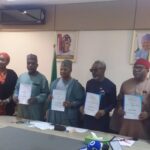By Okon Okon
Some pedestrians using footbridges on Nyanya-Mararaba road, Nasarawa State and other areas in Federal Capital Territory (FCT) Abuja and have expressed concern over their conversion to markets by traders and siege by beggars.
They expressed their views in separate interviews with the News Agency of Nigeria (NAN) on Wednesday in Abuja, urging the government to halt such activities to enhance free flow of human traffic.
Pedestrian bridges throughout the world are constructed at strategic points to help people cross busy highways without having to risk their lives because of some reckless drivers.
They, however, worried that that the purpose of these bridges had been defeated by the traders and physically challenged who misused them.
Augustine Itakpa, a civil servant, worried that men, women and children, besieged the pedestrians’ bridges Nyanaya-Mararba road, Airport road and other areas in the city, mostly in the evenings to patronise traders, who spread their wares to sell.
“On these bridges, hawkers, not only brazenly display their wares, but also engage in competition for buyers’ attention, while in the process hamper the bridge users’ movement.
“Right from the staircases of these bridges and even under them, pedestrians are treated to a display of various items, ranging from cloths, belts, shoe polish, to food, snacks and soft drinks, among others,” he said.
He noted that on the bridges proper, the displayed wares and pedestrians had to compete for space.
According to him, if any pedestrian as much as side steps, he or she is likely going to step on the displayed items, which dot both sides of the bridges.
“It is an eye sore, as you can see that apart from the hordes of traders; physically challenged persons and sundry characters that solicit alms have also made their presence felt on these bridges.
“They also jostle to make quick money from users of the bridge,” he said.
Mr Harrison Innocent, a resident, also expressed worry over the situation, saying that Mararaba pedestrian bridge in particular is no longer comfortable for people to pass through.
Innocent said that the situation on the bridge was more worrisome.
“Many of the traders behave as if the place belongs to them. If you mistakenly march on their wares, you are in for a big trouble, you really need to mind yourself or have the traders to contend with.
“It is that pathetic. It seems the relevant authorities have given up on the place, other users even avoid pedestrian bridges because of harassment by beggars,” he said.
He said that there was, however, a big relief few months ago, when some female soldiers dislodged traders and beggars from footbridges at Mararaba.

“The recurrence of this ugly situation is when those female soldiers were no more around.
“I tell you the impacts of their presence were felt both on the road and on top of this bridge, I think Nasarawa State Government should take action against this act and stop it completely,” Innocent appealed.
He described the situation as `an eyesore’ before the strangers plying the road, seeing in particular, the beggars lined up there and even turning the bridge to their dwelling place.
Also commenting, a user, Mrs Salamatu Muhammad, said there was need for the government to set up a taskforce to go round the bridges within the state to evacuate people who were turning such places to markets.
“It is not only here at Mararaba, if you go to city centre in Abuja and places like Airport road, Kubwa expressway, where we have heavy human traffic, the situation is the same.
“People are no longer comfortable to use the bridges as traders and beggars have taken over them,” she said.
Ms Comfort Richard, a student, alleged that even criminals were operating on the bridges, snatching peoples’ items like phones and handbags.
Richard appealed that action be taken by the government against using pedestrian bridges for trade and dwelling places, adding that bridges should be used for what they were built for.
A civil servant, who craved for anonymity, also corroborated Richards’ position on the use of pedestrians’ bridges as market places.
“There is need for government to always ensure that footbridges serve only the purpose they were designed to serve.
“To ensure this, appropriate government agencies should not hesitate to disperse traders as soon as they begin to gather on footbridges,” said the civil servant.
However, some of the traders said that they were on the bridges because of high cost of shops.
One of the traders, Mr Eze Nwachukwu, told NAN that it was the economic situation in the country that conditioned him to the bridge.
He said that he was willing to sell inside a shop but could not afford one due to the high cost of renting a store.
“Most of the shops being built by the government are too expensive. Where do I get such money?
“If not for lack of cash, you won’t see me here because it is not the best place to trade. Government should have sympathy on us,” he said.
Also, another trader, Mrs Lucy Benson, appealed to the government to consider some of the petty traders who could not afford to pay for the shops by reducing costs of shops in the market.
“It is even risky to some of us to sell outside because our goods are not secured, you can imagine us packing things up and down every day we want to come out to sell.
“If I could afford prices of shop, why should I come outside here to sell when my goods are not saved,” she said.
Meanwhile, Alhaji Muktar Galadima, Director, Development Control, FCT, speaking in an interview with NAN, decried the alarming rate of incursion into public infrastructure in the territory.
Galadima said that FCTA had always frowned at occupying of footbridges by beggars and its conversion to selling points by traders.
He described it as violation of the FCTA environmental law which he said would not be allowed to go on.
“Such incursion is against the Abuja Master Plan. We won’t allow it to go on,” he said.
Galadima said that the department had the backing of the provisions of the FCT Act of 1976 as well as the Urban and Regional Planning Act of 1992, to enforce strict compliance with the Abuja Master Plan.
According to him, the FCT Administration has reiterated its resolve to recover pedestrian walkways in its efforts to ease human and vehicular movement, especially within the city.











